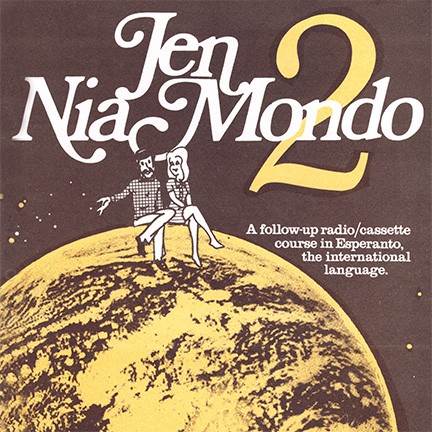
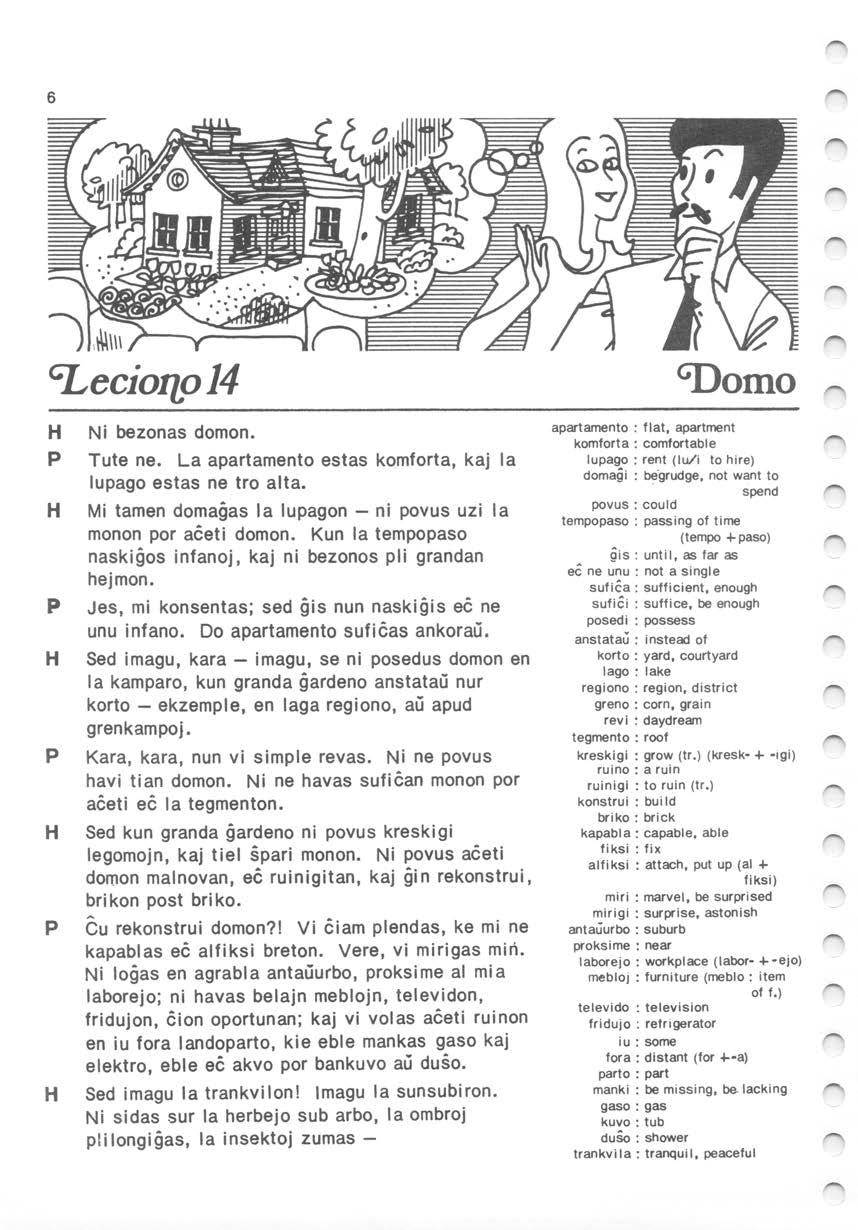
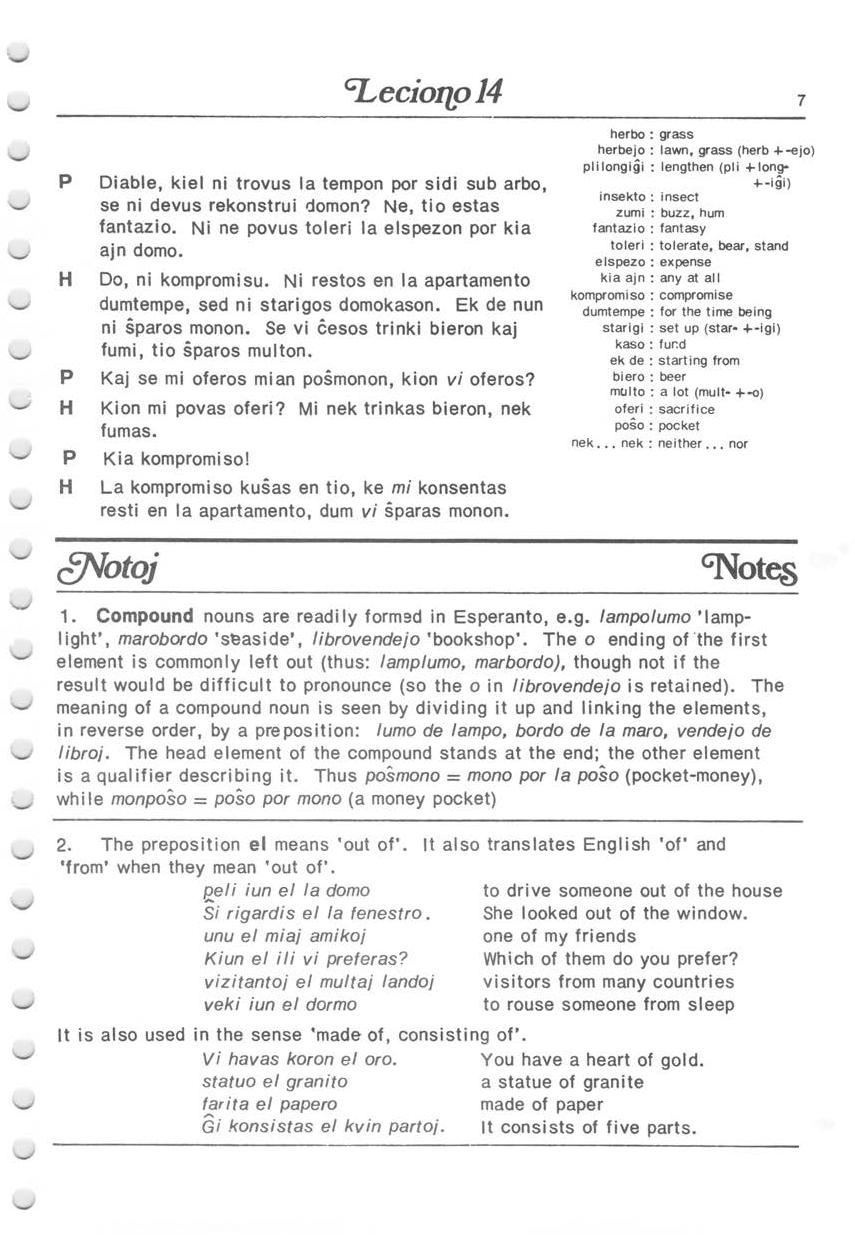
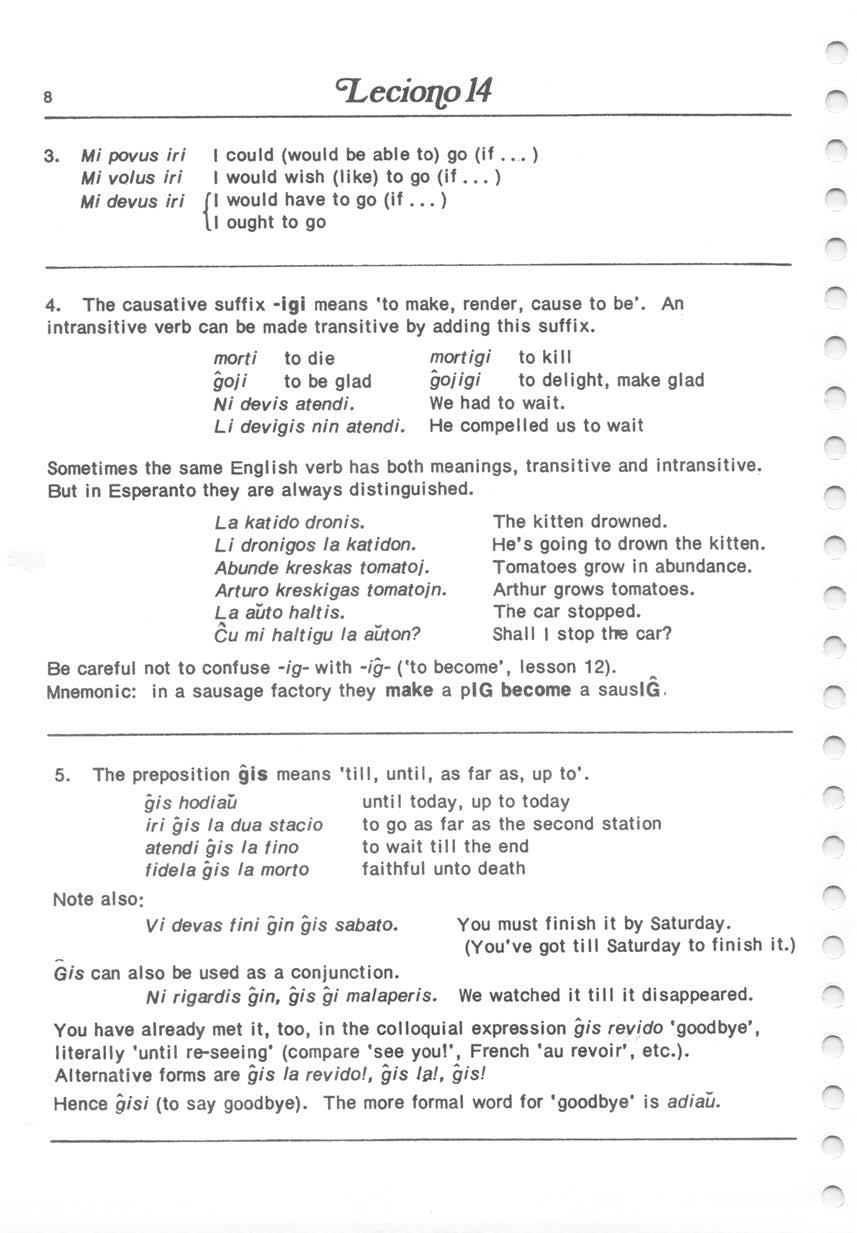
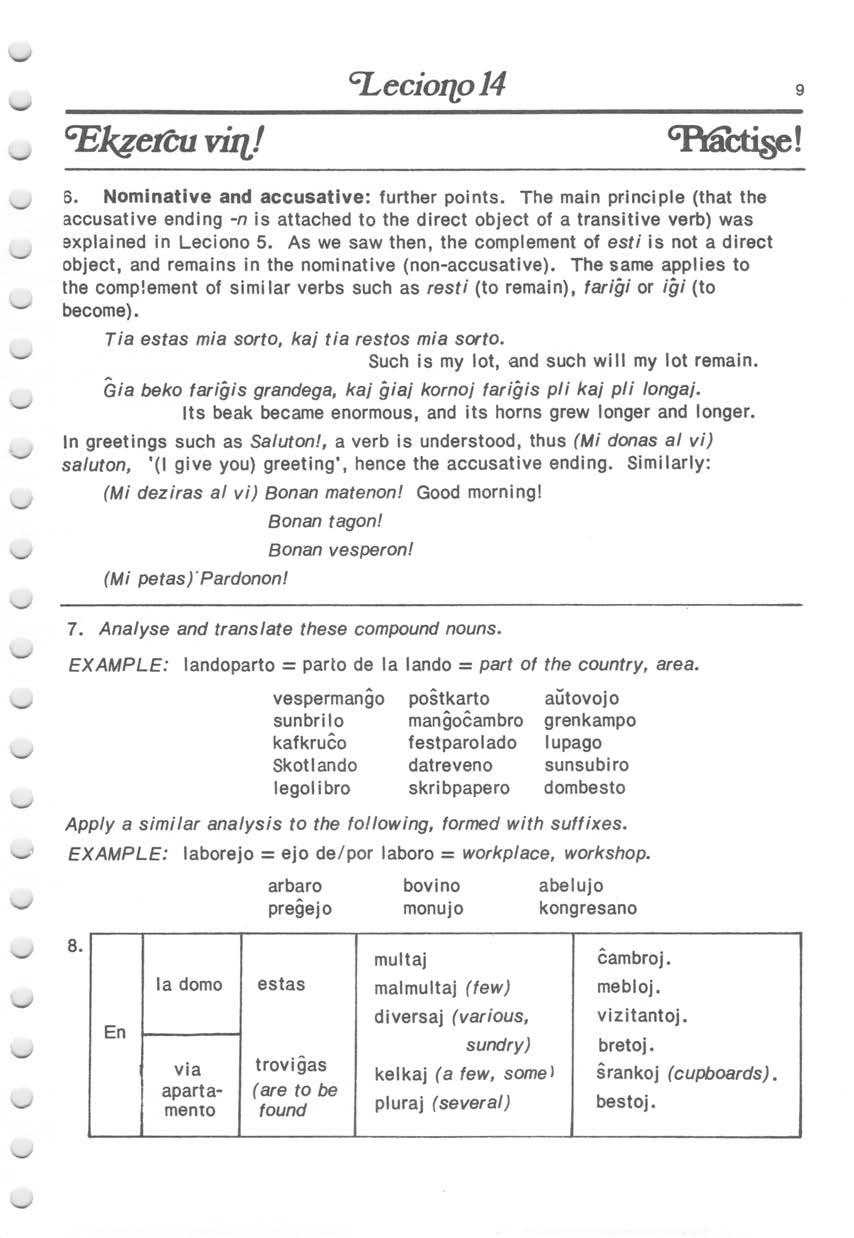
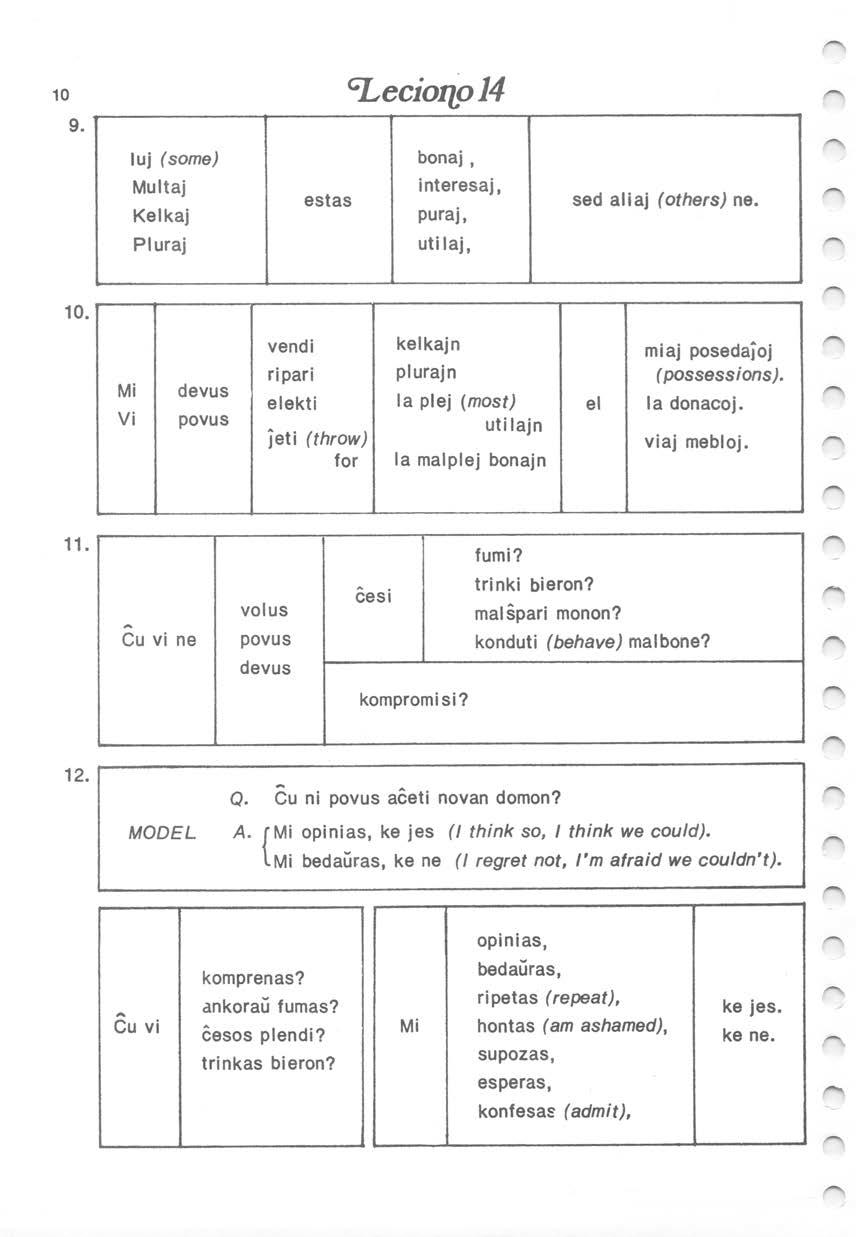
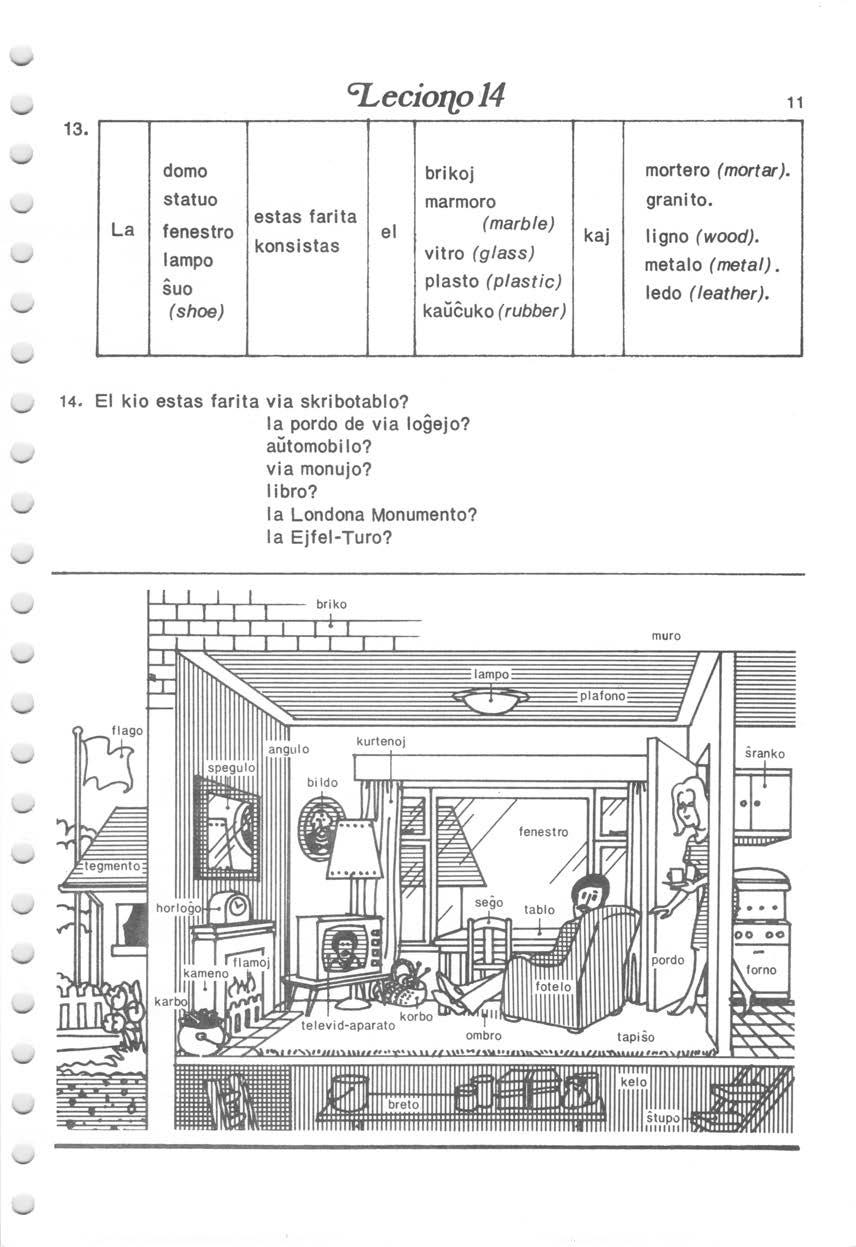
Section 15 Traduku
H. Are you content with our flat? Do we have enough rooms?
P. Our kitchen is small, but the dining room and cellar are quite big. We also have two bedrooms.
H. Yes, but do you not want to have an allotment [parcelo]? Would you like to grow tomatoes and vegetables? Would you like to hear the insects humming [= to hum] there?
P. You have many questions! Do we have money for an allotment? Would we have time to grow anything? If we were to have children, how would we find time to work in an allotment?
H. So you do not want a larger kitchen, you do not want to grow vegetables, you prefer to have children. You forget [that] children also cost money and time.
P. I suppose [that] you are right. Our flat has two bedrooms and various bits of furniture, cupboards and shelves. I am quite content. I am sorry, but I think [that] we must not complain.

Sample answers are offered below
The previous lesson commented on the group of 40 or so roots known as affixes. A second group of roots may for lack of a precise term be called ‘wordlets’, literally little words. This term refers to the 150 or so roots which are complete in themselves, i.e. they require no ‘ending’. They include cardinal numbers, prepositions, pronouns, correlatives, con- and sub-junctions, adverbs of time and some others. Unsurprisingly the group contains no adjectives, nouns or verbs as these all require ‘endings’ to confirm their role. Of course many wordlets can also take ‘endings’ and act as adjectives, nouns, etc. This happens to a greater extent than with equivalent words in English.
This practice may seem strange, even inhibiting. Such a reaction is normal. Let it wash over you at present. Instead concentrate on enjoying the lessons and dialogues for themselves. The rest will follow as you grow more familiar with manipulating the material.
Please attempt the exercises before consulting the material below
Lesson 14 Answers
Section 7
Vespermanĝo – manĝo de la vespero : evening meal
sunbrilo – brilo de la suno : shin(e)ing of the sun, sunshine
kafkruĉo / kafokruĉo – kruĉo por kafo : coffee jug
Skotlando – lando de la skotoj : land of the Scots, Scotland
legolibro – libro por leg(ad)o : book for reading, reading book
poŝtkarto – karto por la poŝto(sistem) : postcard
manĝoĉambro – ĉambro por manĝ(ad)o – dining room, eatery
festparolado – parol(ad)o por fest(okaz)o : speech for a special occasion
datreveno – reveno de (speciala) dato (en la jaro) : anniversary
skribpapero – papero por skrib(ad)o : writing paper
aŭtovojo – vojo por aŭto(j) : motorway
grenkampo – kampo por greno(j) / kreskigi grenon : cornfield
lupago – pago por lu(ad)o : (payment for) rent
sunsubiro – subiro de la suno, ir(ad)o de la suno suben : sunset
dombesto – besto (taŭga) por domo(j) : domestic animal, house pet
Note: the addition of ‘ad’ like ‘ing’ in English draws attention to the action involved.
arbaro – aro /grupo de arboj : set of trees, wood
preĝejo – ejo / loko por preĝ(ad)o : prayer house, church
bovino – ino / femalo de bovo : female ‘cow’
monujo – ujo / sako por mono : ‘bag’ for money, purse abelujo – ujo por abeloj : beehive (!)
kongresano – ano / membro de kongreso : congress member
A distinguishing characteristic of affixes as against other roots is that they do not need to add any linking vowel to aid pronunciation – cf aŭtovojo, legolibro, manĝoĉambro supre. Suffixes almost without exception begin with a vowel. They are designed to link easily to other roots.
Section 8
En la domo estas multaj ĉambroj – in the house [there] are many rooms
En la domo estas malmultaj mebloj – in the house there are few /not many items of furniture
En la domo troviĝas kelkaj vizitantoj – some visitors are in the house
En via apartamento troviĝas pluraj ŝrankoj – [there] are several cupboards to be found in your apartment
En via apartamento estas diversaj bretoj – [there] are sundry shelves in your flat.
En la domo estas multaj bestoj –[there] are a lot of animals in the house.
Page 10
Section 9
Iuj estas bonaj, sed aliaj ne [estas] – Some [people] are good. but others are not.
Multaj estas interesaj, sed aliaj ne [estas] – Many are interesting, but others aren’t
Kelkaj estas puraj, sed aliaj ne [estas] – Some are clean, but others aren’t.
Pluraj estas utilaj, sed aliaj ne – Several are useful, but others are not.
Section 10
Mi devus vendi kelkajn el miaj posedaĵoj – I would have to sell some of my possessions [in those circumstances]
Mi devus ripari plurajn el miaj mebloj – I would have to repair several pieces of furniture [in those circumstances]
Vi povus elekti la plej utilajn el la donacoj – You would be able to choose the most useful [in those circumstances]
Vi povus ĵeti la plej malbonajn el viaj mebloj for – [in those circumstances] you would be able to throw out your worst bits of furniture.
Section 11
Ĉu vi ne volus ĉesi fumi? Would you not be willing to stop smoking [in those circumstances]?
Ĉu vi ne povus ĉesi trinki bieron? Would you not be able to stop drinking beer [in those circumstances]?
Ĉu vi ne devus kompromisi? Would you not have to compromise [in those circumstances]?
Section 12
Ĉu vi komprenas? Mi opinias, ke jes – Do you understand? I think I do.
Ĉu vi ankoraŭ fumas? Mi bedaŭras, ke jes. Are you still smoking? I regret so, I do [smoke]
Ĉu vi ĉesos plendi? Mi supozas, ke jes. Will you stop complaining? I suppose so. [Yes, I will]
Ĉu vi trinkas bieron? Mi ripetas, ke ne. Do you drink beer? I repeat I don’t [drink beer]
Ĉu vi komprenas? Mi hontas, ke ne. Do you understand? I am ashamed I don’t.
Ĉu vi ankoraŭ fumas? Mi konfesas, ke jes. Do you still smoke? I admit that’s a ‘yes’
Page 11
Section 13
La domo estas farita el brikoj kaj mortero – The house is made from bricks and morter.
La statuo estas farita el marmoro kaj granita – The statue is made from marble and granite
La fenestro konsistas el vitro kaj ligno – the windo consists of glass and wood.
La lampo estas farita el plasto kaj metalo – The lamp is made of plastic and metal.
La ŝuo estas farita el kaŭĉuko kaj ledo – the shoe is made from rubber and leather.
Section 14
El kio estas farita via skribtablo? Ĝi estas farita el ligno
El kio estas farita la pordo de via loĝejo? La pordo de mia loĝejo estas farita el ligno kaj vitro.
El kio estas farita via aŭtomobilo? El aero. Mi ne havas aŭtomobilon.
El kio estas farita via monujo? Mia monujo estas farita el bona ledo.
El kio estas farita via libro? Mia libro estas farita el papero.
El kio estas farita La Londona Monumento? Mi ne scias el kio la Londona Monumento estas farita, ĉar mi ne loĝas en Londono.
El kio estas farita La Ejfel-turo? Mi supozas, ke ĝi estas farita el metalo.
Section 15
H. Ĉu vi estas kontenta pri nia apartamento? Ĉu ni havas sufiĉajn ĉambrojn?
P. Nia kuirejo estas malgranda sed la manĝoĉambro kaj la kelo estas sufiĉe grandaj. Ankaŭ ni havas du dormĉambrojn.
H. Jes, sed ĉu vi ne deziras havi parcelon? Ĉu plaĉus al vi kreskigi tomatojn kaj legomojn? Ĉu plaĉus al vi aŭdi la insektojn zumi tie?
P. Vi havas multajn demandojn! Ĉu ni havas monon lui parcelon? Ĉu ni havus tempon kreskigi ion? Se ni havus infanojn, kiel ni trovus tempon labori en ĝi?
H. Do vi ne deziras havi pli grandan kuirejon, vi ne deziras kreskigi legomojn, vi preferus havi infanojn. Vi forgesas, ke infanoj ankaŭ kostas monon kaj tempon.
P. Mi supozas, ke vi pravas. Nia apartamento havas du dormĉambrojn kaj diversajn meblojn, ŝrankojn kaj bretojn. Mi estas sufiĉe kontenta. Mi bedaŭras, sed mi opinias, ke ni devas ne plendi.
Vocab 14 : Here are the new words to learn . . .
Alfiks/i
Anstataŭ
Antaŭ/urb/o
Apartament/o
Bier/o
Brik/o
Domaĝ/i
Dum/temp/e
Duŝ/o
Eĉ ne unu
Ek de
El/spez/o
Fantazi/o
Fiks/i
For/a
Frid/uj/o
Gas/o
Ĝis
Granit/o
Gren/o
Herb/o
Herb/ej/o
Ig/i
Iĝ/i
Insekt/o
Iu
Iu ajn
Kapabl/a
Kas/o
Kaŭĉuk/o
Komfort/a
Kompromis/o
Konstru/i
Kort/o
Kresk/i (ntr)
Kresk/ig/I (tr)
Kuv/o
Labor/o
Labor/ej/o
Lag/o
Led/o
Lign/o
Lu/i
Lu/pag/o
Lu/ig/i
Mank/i
Marmor/o
Mebl/o
Metal/o
Mir/i
Mir/ig/i
Morter/o
Mult/o
Nek….nek
Ofer/i
Part/o
Pas/i
Plast/o
Pli/long/iĝ/i
Poŝ/o
Posed/i
Pov/us
Proksim/e
Region/o
Rev/i
Ruin/o
Star/ig/i
Ŝu/o
Sufiĉ/a
Sufiĉ/i
Tegment/o
Televid/il/o
Temp/o
Tempo/pas/o
Toler/i
Trankvil/a
Vitr/o
Zum/i
Attach to, put up
Instead of
Suburb
Flat, apartment
Beer
Brick
Begrudge, not want to
For the time being
Shower
Not a single
Starting from
Expense
Fantasy
Fix, make fast
Distant
Refrigerator
Gas
Till, until, as far as
Granite
Corn, grain
Grass
Lawn, grass
Render, cause to be
Become
Insect
Someone, a certain
Anyone at all
Capable, able
Till, cashbox; fund
Rubber
Comfortable
Compromise
Build, construct
Yard, courtyard
To grow cf crescent
Make (to) grow
Tub, vat
Work cf labour
Workplace
Lake
Leather
Wood, timber
To hire from, rent from
Rent (payment)
Hire to, rent to
Be missing, be lacking
Marble
Furniture, item of
Metal
Marvel, be surprised
Surprise, astonish
Mortar (for building)
A lot
Neither…nor
Sacrifice cf offering
Part, share
To pass (ntr)
Plastic
Become longer
Possess
Would be able to (if)
Nearby cf (ap)proximate
Region, district
Daydream, reverie
Ruin
Set up, establish
Shoe
Sufficient, enough
Suffice, be enough
Roof
Television set
Time cf temporal
Passage of time
Tolerate, bare, stand
Tranquil, peaceful
Glass
Buzz, hum